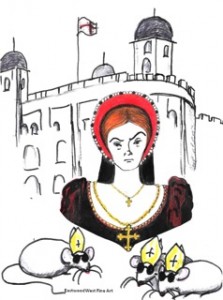Of Mice and Mitres
Posted in General on October 16th, 2011 by Eugene Finerman – 8 Comments October 16, 1555: The Mary Tudor Cookbook
October 16, 1555: The Mary Tudor Cookbook
On this day in 1555, Hugh Latimer and Nicholas Ridley inspired two-thirds of a nursery rhyme. They were not intentionally whimsical; Bishops are not supposed to be frivolous, Protestant ones seldom are, and being burned at the stake is never fun. As if they needed further martyrdom, they were Cambridge graduates being publicly executed at Oxford.
What had Latimer and Ridley done to earn their kindling? Both men had been vociferously Protestant at a time when the monarch was just as dogmatically Catholic. Latimer had been too Protestant for Henry VIII–and had a few cautionary “timeouts” in the Tower of London; so just imagine the reaction of Queen Mary, the pinup girl of the Counter-Reformation. Worse for Latimer, he had supported the failed Protestant coup to place Lady Jane Grey on the throne. So Latimer was already condemned for treason, but Mary preferred to execute him for heresy. Guess which crime had a more painful sentence.
Ridley had risen to royal favor in the 1530s defending the King’s ecclesiastical supremacy, which included the divine right to dump the first wife. For some reason, Queen Mary resented her mother being declared a whore and she being demoted to “bastard.” When the erstwhile bastard became queen in 1553, Ridley went in person to Mary to apologize for any past misunderstandings. But “Spanish whore” is a difficult term to misinterpret; it is rarely synonymous with “martyred saint”, which is how Mary referred to her mother. If Ridley received any mercy from the vindictive queen, it was his being transferred from the stressful job of Bishop of London to the salubrious simplicity of the Tower. Latimer was also vacationing there.
After a year in the Tower, the two were sent to Oxford where an inquisition of impeccably Catholic judges awaited them. Latimer and Ridley knew they were condemned; no one ever beats a heresy charge. However, you can grovel your way out of the most permanent sentence. The men simply had to recant every tenet of Protestantism, fully confess their errors and fervently embrace Holy Mother Church. In return for their humiliation and conversion, they probably would have gotten off with a few years in prison. But Latimer and Ridley would not bend, instead debating every religious point with their accusers. Unfortunately, the Inquisition was not known as an ecumenical good sport.
The men were burned alive in a public square. It was said that Latimer’s last words were, “Be of good comfort, Master Ridley, and play the man; we shall this day light such a candle, by God’s grace, in England, as I trust shall never be put out.”
No, that is not the nursery rhyme… or even two thirds of it. The remaining inspiration was Thomas Cranmer, the Archbishop of Canterbury, who was burned alive at Oxford some five months later. Mary showed considerable restraint in not lighting the pyre herself. She really, really, really hated him. Everything about him seemed damning. When he still was supposed to be a Catholic priest, he had been married. He had risen at the recommendation of the Boleyn family, and he had endeared himself to Henry VIII by being the chief advocate for the first divorce. As if to further aggravate Mary, Cranmer did not even prove to be loyal to his Protestant convictions. When confronted by the Oxford tribunal, he recanted. Given his groveling and Church etiquette, his life should have been spared. But Mary had made her feelings known to the judges. (“Do you enjoy your tenured niche at Oxford or would you prefer being a chaplain at a leper colony in Wales?”) So, when Cranmer was condemned to death, he recanted his recantation.
And, with his death, the wags and wits of the time memorialized the three executions with a nursery rhyme. And you know it, this story of heretical bishops destroyed by an irate queen. Heretics are figuratively blind, so you could say “three blind mitres, three blind mitres…”
Or something similar.